Kieron Gillen: Uber-Stoked For Avatar's New Series
Feb 14, 2013
 When not spinning vinyl black circles of his favorite B-sides of 90s indie girl groups, Kieron Gillen is opening a file cabinet in his mind to unleash some of the most imaginative storytelling since Grant Morrison's JLA. The man is quite polished. And now yet another flavor of the month is to be introduced to fans with Uber #0 (FEB130769) from Avatar Press, listed in the February issue of the PREVIEWS catalog. Get ready to be punched. This one isn't pretty.
When not spinning vinyl black circles of his favorite B-sides of 90s indie girl groups, Kieron Gillen is opening a file cabinet in his mind to unleash some of the most imaginative storytelling since Grant Morrison's JLA. The man is quite polished. And now yet another flavor of the month is to be introduced to fans with Uber #0 (FEB130769) from Avatar Press, listed in the February issue of the PREVIEWS catalog. Get ready to be punched. This one isn't pretty.
**********
PREVIEWSworld: When we last saw you at San Diego Comic Con we were talking about your work on Marvel's Uncanny X-Men. Now you're doing something completely different with Uber #0 for Avatar Press. We've gone from super-powered mutants to super-powered soldiers for the dying Reich. This title screams Bring On The Bad Guys. Or is Abraham Lincoln: Vampire Hunter a more appropriate reference?
Kieron Gillen: More the former than the latter, but I wouldn't put either as a close comparison. It's not even really about villains. It's about war and people turning themselves into monsters. Monsters are just people. It basically posits that the promised "Wunderwaffen" that the Reich were threatening (and promising) existed, and were enhanced humans — the Ubermensch of the title. It completely lacks any winks to camera or meta games - it takes the device of enhancing humanity into living weapons entirely seriously, and uses that to illuminate aspects of WW2. It's a horror story, because it's a war stories and the idea of Nazi Germany — even in its dying days — getting hold of a weapon like a superhuman. It’s like playing with the idea of them getting the bomb before the US. This is meant to scare and disturb people.
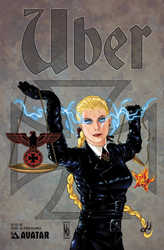 PREVIEWSworld: Avatar seems like such a perfect home for an all-out bad guys book that "redefines the genre." How did things shake out between you and the publisher when you got this series approved for publication? Is this something you've been sitting on for a while, or did William Christensen get the ball rolling?
PREVIEWSworld: Avatar seems like such a perfect home for an all-out bad guys book that "redefines the genre." How did things shake out between you and the publisher when you got this series approved for publication? Is this something you've been sitting on for a while, or did William Christensen get the ball rolling?
Kieron Gillen: The story behind Uber is really a strange one. Basically, five years ago - before I had done any work in the Marvel Universe — William approached me to talk about doing a book. He wanted to do a WW2 superhero book with an eye on the arms-race. I had a think, and came back with this 30,000 word bible for the whole series. I wrote the first issue in the same month I wrote my first MU story - a Dazzler short, for the record. Since then, Caanan had to work on another project for a while, which delayed the book. I've been writing the scripts through that whole period, alongside my other work, and took it up a gear when Caanan went back onto Uber full-time.
It's hopefully the best of both worlds. The most radical and angry ideas for the genre, increasingly executed with the craft that the last years have taught me. It’s worth noting that clearly I went back and reworked a bunch of lettering from the earliest work. Because you would, wouldn't you?
PREVIEWSworld: So the Nazis have the Uber, and the Allies do not. It would seem the outcome of any battle would then be predictable. But yet it can't be, or else we don't have a story. So what lies under the frozen ice? What is it about the human condition that you want to bring to light for the reader?
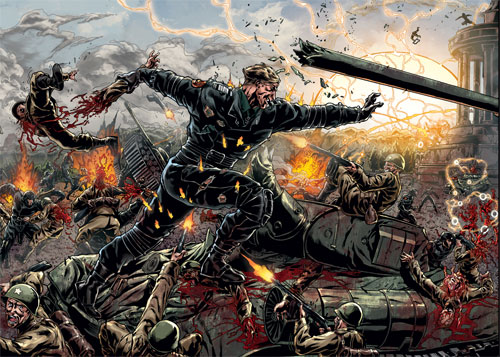 |
Kieron Gillen: The trick is the credibility of the thing. We start right at the end of the war, a handful of days before surrender. I wanted to present not the triumphant Reich, but a broken one... which gets this incredible twist of fate. So given that, how do we progress? Make the Ubers too powerful and, as you note, they immediately win the war? If you make them too weak, the war ends immediately. This basically resulted in a lot of careful world-building and calculation. What limits do the Ubers operate under? What can they do? What can't they do? And what *will* they do? (The arms race angle is important - you know those bits in a war comic where someone like Ennis talks about a detail of the hardware, like misplaced fuel tanks or whatever? Our Ubers are like that. Different versions of the same Uber could even have their own quirks. This is superhumans as hardware.)
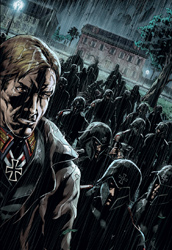 I do some very careful balancing, and make some moves to ensure the way I move it is at least credible. For a war comic — and a superhero comic, especially — Uber has a particular economic, high level bent. It's interested in production and R&D and research.
I do some very careful balancing, and make some moves to ensure the way I move it is at least credible. For a war comic — and a superhero comic, especially — Uber has a particular economic, high level bent. It's interested in production and R&D and research.
The comic starts with the Allies having no Uber research whatsoever. That clearly has to change, and quickly. That's absolutely our story, and by the end of the issue #0, you'll see where we're going. That tension drives it. The Allies are heavily on the back-foot for much of the early part of the series.
Themes? The main one is the weaponization of people, made literal. Turning people into these living battleships is an interesting way to explore the "Just following orders" mindset, for one.
But you're right: if I didn't think I had anything to say about WW2 and people, I wouldn't be doing the book.
PREVIEWSworld: Are there any contemporary works for WWII comics that you found particularly inspiring when you were developing Uber? Or is your fascination with this time period stem from something else? Like you have this massive WWII DVD collection that takes up an entire closet?
Kieron Gillen: War comics are something that are more core to British readers of my generation than U.S. readers. While everyone talks about 2000AD, when I was a kid, we were still in the tail end of the British war comics' dominance. As a kid, I read a lot of the Commando books, Victor and - most of all - Battle.
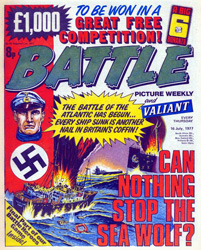 Something like the WW1 comic Charlie's War is enormously influential on me as a creator - its pure moral outrage. The influence of that on Uber is pretty clear: it's a book that alternates to the high level strategic view, and the very small, tight and personal ones. We see people make the high level decisions that crush individuals' lives. I was always a big fan of Johnny Red as well, and that interest in the Eastern Front is certainly something you'd find in Uber. (It's a book that deals with most theaters, eventually.)
Something like the WW1 comic Charlie's War is enormously influential on me as a creator - its pure moral outrage. The influence of that on Uber is pretty clear: it's a book that alternates to the high level strategic view, and the very small, tight and personal ones. We see people make the high level decisions that crush individuals' lives. I was always a big fan of Johnny Red as well, and that interest in the Eastern Front is certainly something you'd find in Uber. (It's a book that deals with most theaters, eventually.)
In terms of more contemporary comics, I'm an incredible admirer of what Garth Ennis (and his many collaborators) has done with his war comics in the last decade. It's just phenomenal work, in a variety of modes. I can't recommend it strongly enough. I'm not Garth however. I read around a bunch of history, but it's not that I delved full-on into WW2 before Uber. I had to do the homework to go further, which involved poring over a bunch of maps, reading biographies, and so on. There was very little fiction in the mix - a notable exception being the German war film from the 1990s, Stalingrad, which influences the mood of the combat, especially early on. I bought a copy for Caanan and sent it over. More documentaries, however. It was a welcome chance to revisit The World At War, for a start.
Emotionally though, WW2 is important. Its major events are things which fundamentally shape my understanding of the human condition. I feel we still live in its shadow, and — moreso — we should do so. It was the worst single event in human history, and we cannot risk forgetting it. If you want to look at a theme across my work of the last few years, you'd find a bunch — but an interest in how the 19th and 20th centuries gave birth to our current condition is fairly high up the list.
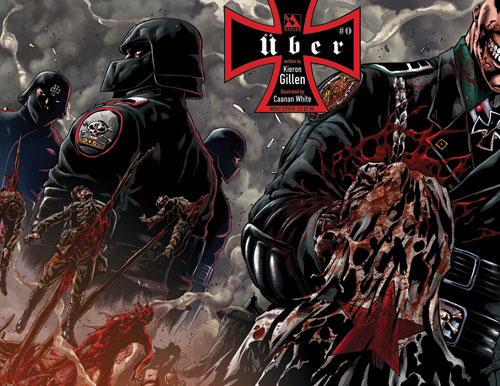 |
PREVIEWSworld: When you sit down to write this book, it's a major commitment as it’s an ongoing series. What do you hope to accomplish with this book? What bar do you need to jump? And how will you know if you've jumped that bar?
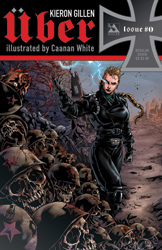 Kieron Gillen: As I mentioned, the book has a curious pre-history. Thankfully, the “me” of five years was quite the conscientious young man. That Bible outlined the whole series, arc by arc. So when I came back to it to write more, I had a firm blueprint there. It's the sort of document that if I were to suddenly explode, someone else could use it to complete the task. By implication you can take that means Uber has an ending of its main story down the line. But that's a long way off, and where we leave it certainly leaves open for a further large scale story. (The world-building is key to Uber. It's a little like Crossed in that it would absolutely support minis outside of the main arc. And Uber's structure itself is flexible enough to insert stories exploring areas I'm interested in. I'd love to do something in — say — Burma or Greenland, for example.)
Kieron Gillen: As I mentioned, the book has a curious pre-history. Thankfully, the “me” of five years was quite the conscientious young man. That Bible outlined the whole series, arc by arc. So when I came back to it to write more, I had a firm blueprint there. It's the sort of document that if I were to suddenly explode, someone else could use it to complete the task. By implication you can take that means Uber has an ending of its main story down the line. But that's a long way off, and where we leave it certainly leaves open for a further large scale story. (The world-building is key to Uber. It's a little like Crossed in that it would absolutely support minis outside of the main arc. And Uber's structure itself is flexible enough to insert stories exploring areas I'm interested in. I'd love to do something in — say — Burma or Greenland, for example.)
My aims? To do a large, serious, humane and horrifying story with all the skill myself and Caanan can bring to bear. Caanan has seven issues worth of comics in the can, and I've written the twelfth issue. I think it's working.
There's a line I drop at the end of the writers' letter in issue #0: "I hope you find it fascinating and compelling. I hope you don't enjoy it."
That's basically my aim.
**********
Check out our previous interview with Kieron at San Diego Comic Con 2012, where he talked about Young Avengers!




